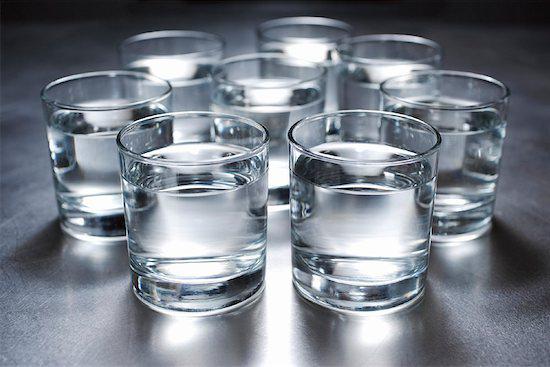Should You Really Drink 8 Glasses of Water A Day?
It is a known fact that water is a large component of the human body and plays a crucial part in maintaining a normal physiological balance. I’m sure you’ve heard of the saying that goes,
“You are what you eat”
But to think of it in a more literal way, you are mostly what you drink. It’s true because the average adult human body is made up of 60% water, according to a National Institutes of Health report. This includes most of our brain, heart, lungs, muscles, and skin, and even about 30% of our bones.
Why is water so important?
“Water’s involved in every type of cellular process in your body, and when you’re dehydrated, they run less efficiently - that also includes your metabolism. Imagine your body functions like a car: if you have sufficient oil and gas, it will run more efficiently. It’s the same with your body.”
Some of the important roles of water include helping us regulate our internal pressure, transporting nutrients throughout our bodies, flushes waste, forms saliva, lubricates joints and even serves as a protective shock absorber for vital organs and growing fetuses.
Basically, lack of water in our body hinders cells, organs and systems to work at its optimal state as it maintains our body’s natural homeostasis. What more dangerous is that dehydration could cause medical ailments if left untreated in the long run. When we don’t get enough water, calcium and other minerals build up in our urine and are harder to filter out, which can form the crystals that makeup kidney and urinary stones.
The Myth behind the 8x8 water rule
You may have heard that you should drink eight 8 -ounce of water (237ml) glasses of water a day, or more commonly known as the “8x8” rule.

This 8x8 rule came about originally from a misinterpretation of an outdated recommendation from 1945 by National Academy of Medicine (NAM) suggesting that a person should consume one milliliter (ml) of water per each calorie of food consumed. Thus, an average diet of 1,900 calories per day would dictate an intake of 1,900 ml (app 64 ounces) of water. This is not entirely true. People interpreted this as a recommendation to drink 1,900 ml of pure water, forgetting the fact that water is also found in abundance in the liquids and foods we consume.
Despite the extensive popularity of this easily remembered rule, numerous studies suggest that this is far more actual drinking water than is necessary for most healthy adults, and there’s no scientific evidence to back the fact up, according to a 2002 review of studies.
The matter of fact is that most people actually consume plenty of water each day, just not in the form of pure water. When considering total water intake, all forms of common beverages - such as water, coffee, tea, soda, and juice - all contribute to our hydration.

On top of that, we tend to disregard the fact that the moisture content in the foods we consume contributes significantly to our daily total water intake. Everything we eat contains some water. Raw fruits and vegetables such as watermelons are more than 90% water by weight.
Different diets naturally contain a different amount of water, but it adds up.
So How much water should You really drink?
The truth is, there is no magic formula for hydration -- everyone’s needs vary depending on their age, weight, level of physical activity, general health and even the climate they live in.
Although the National Academics of Sciences suggests that women consume a total of app 2.7 liters (11 cups) of water from all beverages and foods each day and that men get app 3.7 liters (15 cups) daily, these are just general guidelines and are not supported by firm scientific studies.
So how do you know whether your body is properly hydrated? According to the National Academics of Sciences, the vast majority of healthy people adequately meet their daily hydration needs by letting thirst be their guide. Your body will naturally crave for water when your hydration levels are dropping, and that’s a sign that you should drink more water. On the other note, your urine can also tell whether or not you’re getting enough to drink - dark yellow or orange urine usually indicates dehydration, while well- hydrated urine should look pale yellow or colorless.
The bottom line: Drink up when you’re thirsty, and drink more when you sweat more. Your body will take it from there.
Still have questions about how much water you should be getting every day? Talk to us at Doc2Us. Just click on the link to download the app.
Download our DOC2US app on Google Play Store or Apple Store to chat with a doctor now.
References:
-
Rodrigues, L., Palma, L., Tavares Marques, L. and Bujan Varela, J. (2015). Dietary water affects human skin hydration and biomechanics. Clinical, Cosmetic and Investigational Dermatology, p.413.
-
Valtin, H. (2002). “Drink at least eight glasses of water a day.” Really? Is there scientific evidence for “8 × 8”?. American Journal of Physiology-Regulatory, Integrative and Comparative Physiology, 283(5), pp.R993-R1004.
-
The National Academics Of Sciences Medical Engineering. (2004). Dietary Reference Intakes: Water, Potassium, Sodium, Chloride, and Sulfate. [online] Available at: http://www.nationalacademies.org/hmd/Reports/2004/Dietary-Reference-Intakes-Water-Potassium-Sodium-Chloride-and-Sulfate.aspx [Accessed 2 Apr. 2019].
-
Onemedical.com. (2019). Do I really need to drink 8 glasses of water a day?. [online] Available at: https://www.onemedical.com/blog/live-well/daily-water-intake/ [Accessed 2 Apr. 2019].
Image Soucres:
-
https://www.chatelaine.com/wp-content/uploads/2011/07/97ea4fd54a22b7124f0cfe43f0c1.jpeg
-
https://www.ipsfoods.com/media/categories/beverages.jpg









